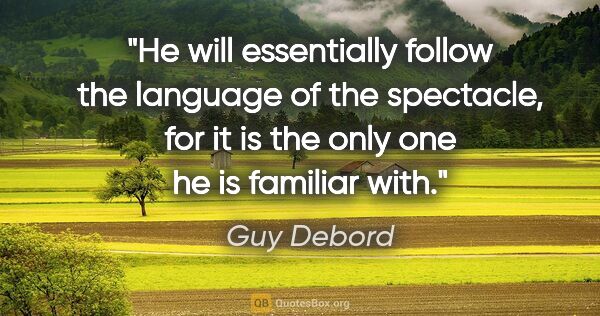Spectacles Quotes (page 3)
Emily suffers no more from pain or weakness now. She will never suffer more in this world. She is gone after a hard, short conflict...Yes there is no Emily in time or on earth now. Yesterday we put her poor, wasted, mortal frame quietly under the chancel pavement. We are very calm at present. Why shoud we be otherwise? The anguish of seeing her suffer is over; the spectacle of the pains of death is gone by; the funeral day is past. We feel she is at peace. No need now to trouble for the hard...
Charlotte Bronte
Part of the reason I actually preferred Twin Peaks's second season to its first was the fascinating spectacle of watching a narrative structure disintegrate and a narrative artist freeze up and try to shuck and jive when the plot reached a point where his own weaknesses as an artist were going to be exposed (just imagine the fear: this disintegration was happening on national TV).
David Foster Wallace
Itt iss Eevill…"
"What is going to happen?"
"Wee wwill cconnttinnue tto ffightt!"…
"And we’re not alone, you know, children," came Mrs. Whatsit, the comforter. "…some of the best fighters have come from your own planet…"
"Who have our fighters been?" Calvin asked.
"Oh, you must know them, dear," Mrs. Whatsit said. Mrs. Who’s spectacles shone out at them triumphantly.
"And the light shineth in the darkness; and the darkness comprehended it not.
Madeleine L'Engle
The facts of nature are what they are, but we can only view them through the spectacles of our mind. Our mind works largely by metaphor and comparison, not always (or often) by relentless logic. When we are caught in conceptual traps, the best exit is often a change in metaphor — not because the new guideline will be truer to nature (for neither the old nor the new metaphor lies “out there” in the woods), but because we need a shift to more fruitful perspectives, and metaphor is often the...
Stephen Jay Gould
At that moment, Harry fully understood for the first time why people said Dumbledore was the only wizard Voldemort had ever feared. The look upon Dumbledore's face as he stared down at the unconscious form of Mad-Eye moody was more terrible than Harry could have ever imagined. There was no benign smile upon Dumbledore's face, no twinkle in the eyes behind the spectacles. There was cold fury in every line of the ancient face; a sense of power radiated from Dumbledore as though he were giving...
J. K. Rowling
TOM!"No answer."TOM!"No answer."What's gone with that boy, I wonder? You TOM!"No answer. The old lady pulled her spectacles down and looked over them about the room; then she put them up and looked out under them. She seldom or never looked THROUGH them for so small a thing as a boy; they were her state pair, the pride of her heart, and were built for "style," not service-- she could have seen through a pair of stove-lids just as well.
Mark Twain
A crude way to put the whole thing is that our presence culture is, both develeopmentally and historically, adolescent. And since adolescence is acknowledged to be the single most stressful and frightening period of human development – the stage when adulthood we claim to crave begins to present itself as a real and narrowing system of responsibilities and limitation (taxes, death) and when we yearn inside for a return to the same childish oblivion we pretend to scorn – it’s not difficult to...
David Foster Wallace
Glory is largely a theatrical concept. There is no striving for glory without a vivid awareness of an audience... The desire to escape or camouflage their unsatisfactory selves develops in the frustrated a facility for pretending -- for making a show -- and also a readiness to identify themselves wholly with an imposing spectacle.
Eric Hoffer
...it is so silly of people to fancy that old age means crookedness and witheredness and feebleness and sticks and spectacles and rheumatism and forgetfulness! It is so silly! Old age has nothing whatever to do with all that. The right old age means strength and beauty and mirth and courage and clear eyes and strong painless limbs.
George MacDonald

The more he identifies with the dominant images of need, the less he understands his own life and his own desires. The spectacle’s estrangement from the acting subject is expressed by the fact that the individual’s gestures are no longer his own; they are the gestures of someone else who represents them to him.
Guy Debord
It takes years to marry completely two hearts, even of the most loving and well-assorted. A happy wedlock is a long falling in love. Men and women marry fractionally, now a small and then a larger fraction... Such a long and sweet fruit needs a long summer to ripen in and a long winter to season in. But real and happy marriage is one of those things so handsome that if the sun were, as the Greek poets fabled it, a god, he might stop the world and hold it still now and then to feast his...
Theodore Parker
